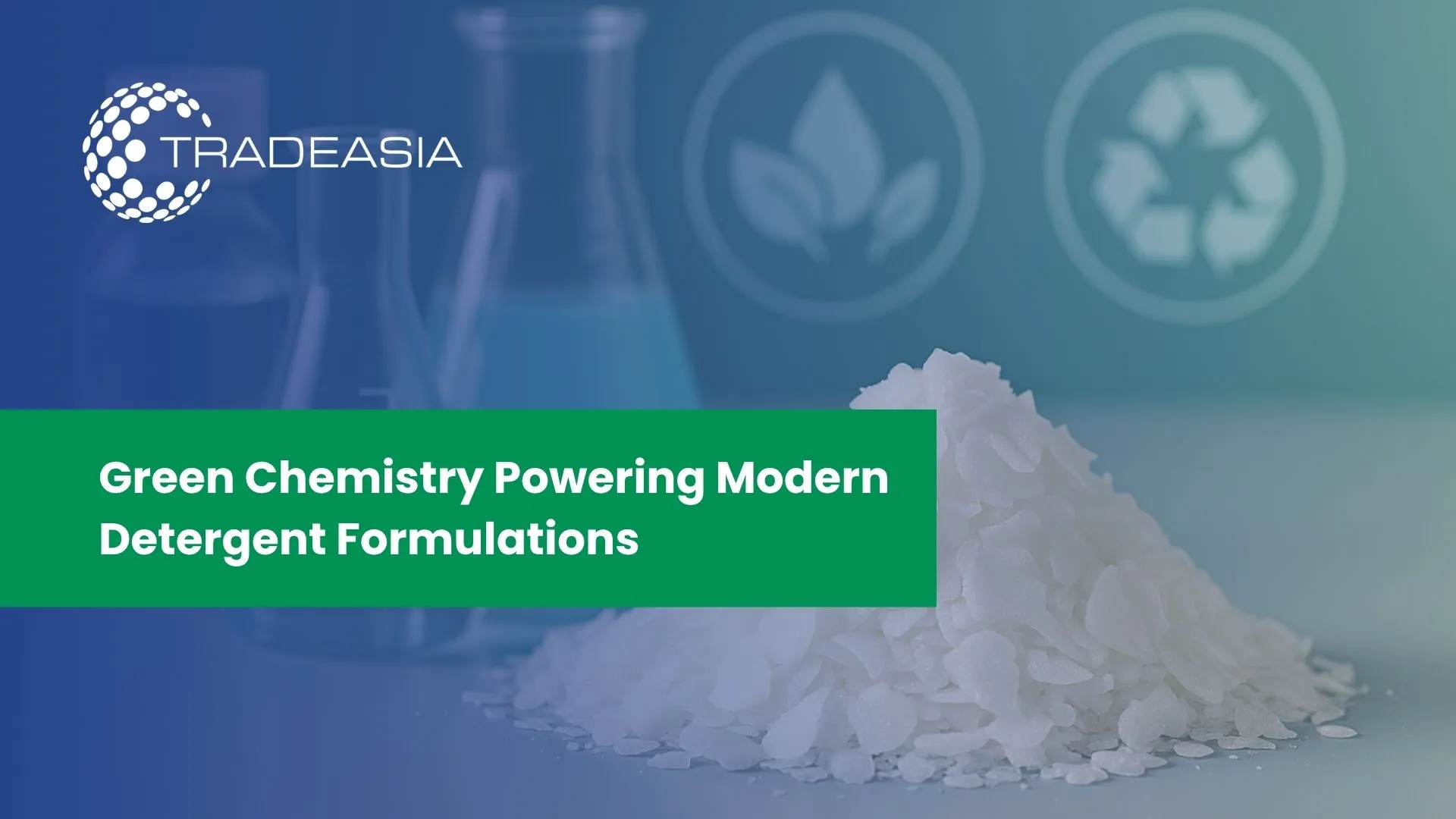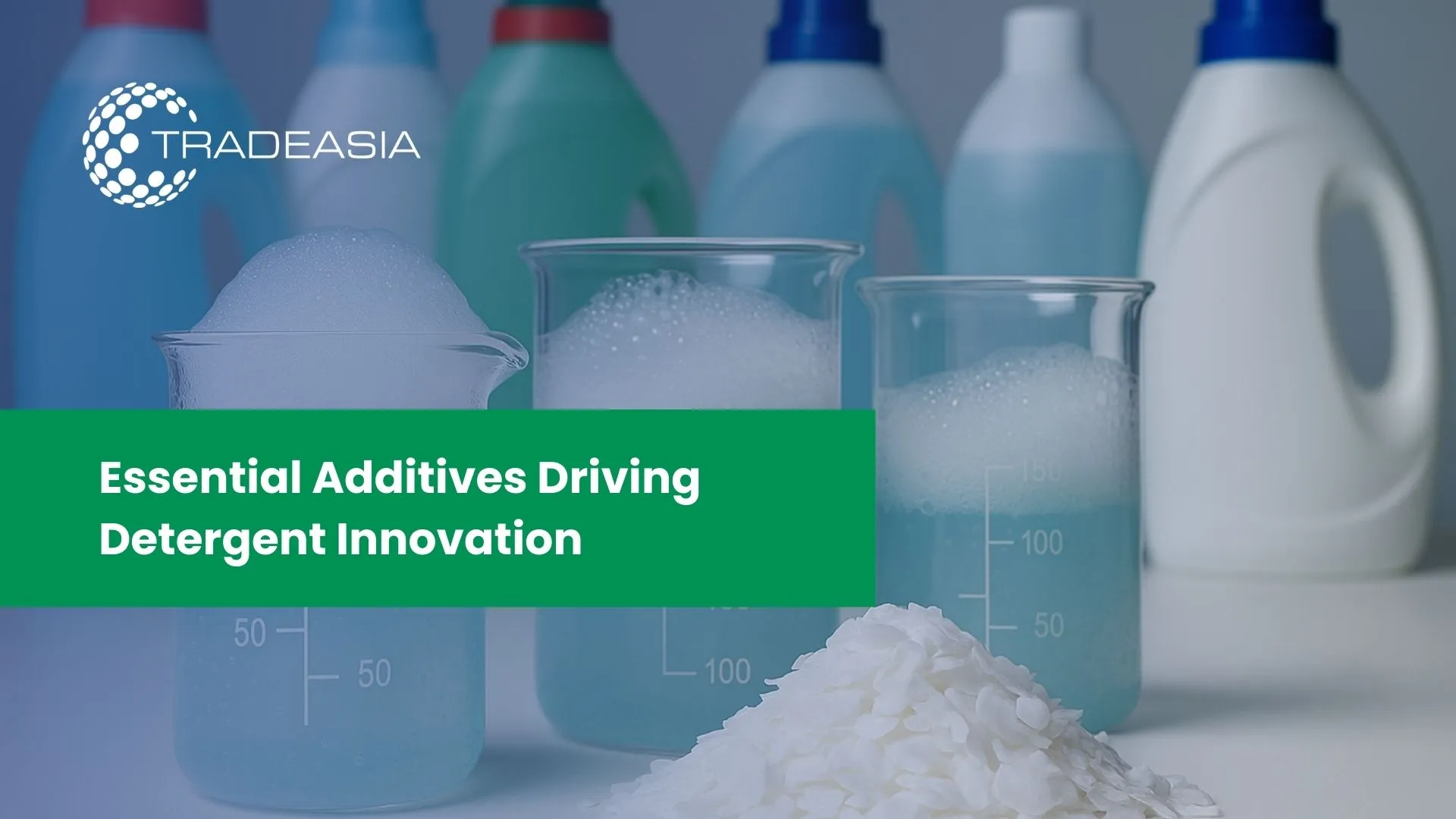Introduction to Cetyl Alcohol
Cetyl alcohol, also known as hexadecanol (C16H34O), is a long-chain fatty alcohol derived from natural sources such as palm oil, coconut oil, or synthetic hydrocarbons. It plays a vital role in detergent and cleaning product formulations, acting as an emollient, thickener, stabilizer, and co-surfactant. Its unique chemical characteristics make it suitable for both household and industrial cleaning applications.
Unlike simple alcohols, cetyl alcohol is non-volatile and non-irritating, offering a mild and stable base for detergent formulations. This property allows it to enhance product texture, improve foaming stability, and contribute to the smooth, consistent feel of liquid and cream-based detergents.
In the context of sustainability, cetyl alcohol is gaining importance as manufacturers increasingly turn to renewable, plant-based feedstocks. Its derivation from natural fats and oils aligns with the detergent industry’s shift toward eco-friendly and biodegradable formulations, supporting a cleaner and more responsible production cycle.
Functional Role in Detergent and Cleaning Products
The most significant contribution of cetyl alcohol in detergent manufacturing lies in its emulsifying and thickening properties. By stabilizing oil-water mixtures, it ensures consistent texture and prevents ingredient separation during storage and application. This function is crucial in liquid and cream detergents that require uniform viscosity and smooth flow characteristics.
In addition to its stabilizing role, cetyl alcohol enhances foam quality and persistence. While not a primary surfactant, it acts synergistically with other cleaning agents to maintain lather during washing. This property improves the perception of product performance, particularly in handwash and personal cleaning products.
Another critical function is moisture retention. Cetyl alcohol helps reduce skin dryness caused by frequent contact with detergents, making it ideal for formulations in dishwashing liquids, personal cleansers, and industrial hand cleaners. This combination of functional and sensory benefits strengthens its role as a versatile additive in the global detergent industry.
Chemical Properties That Enhance Performance
Cetyl alcohol’s chemical structure contributes directly to its high performance. Its long carbon chain provides excellent lubricity and emollience, while the hydroxyl group enables emulsification and compatibility with both hydrophilic and lipophilic substances.
This dual affinity allows it to stabilize complex detergent systems that combine surfactants, fragrances, and conditioning agents. As a result, it maintains formulation consistency under varying environmental conditions, including temperature changes during transportation or storage.
Furthermore, cetyl alcohol has low volatility and good oxidative stability, ensuring long shelf life and maintaining product quality over time. These properties make it an essential ingredient in modern cleaning formulations that require reliability, mildness, and performance under demanding use conditions.
Sustainability and Renewable Sourcing of Cetyl Alcohol
The sustainability profile of cetyl alcohol largely depends on its sourcing. Naturally derived cetyl alcohol is typically produced from palm or coconut oil, both of which are renewable resources. Manufacturers increasingly prioritize Roundtable on Sustainable Palm Oil (RSPO) certification to ensure responsible sourcing that minimizes deforestation and promotes biodiversity.
The process of producing cetyl alcohol involves hydrogenation of fatty acids or fatty acid methyl esters, followed by purification. With technological advancements, this process has become more energy-efficient and less waste-intensive, reducing overall environmental impact.
Some producers are exploring alternative bio-feedstocks, such as algae-based oils or waste cooking oil, to further improve sustainability. These innovations ensure that cetyl alcohol continues to support the detergent industry’s transition toward circular economy principles and carbon reduction goals.
Benefits in Formulating Eco-Friendly Detergents
Cetyl alcohol’s natural origin and functional properties make it a cornerstone of eco-friendly detergent formulations. As a co-surfactant, it enhances cleaning performance without introducing additional harsh chemicals, supporting safer and greener formulations.
In biodegradable detergents, cetyl alcohol helps improve foam stability and viscosity, compensating for the milder nature of natural surfactants. This ensures that eco-friendly products deliver comparable performance to traditional petrochemical-based detergents.
It also contributes to resource efficiency by enhancing formulation stability. Longer-lasting, high-quality detergents reduce waste, minimize packaging needs, and improve user satisfaction—all key factors in sustainable product design. The combination of renewable sourcing, performance stability, and formulation compatibility positions cetyl alcohol as an essential ingredient in the global movement toward cleaner, safer, and more sustainable detergents.
Environmental Impact and Biodegradability
Cetyl alcohol is considered environmentally safe and readily biodegradable. Studies show that naturally derived fatty alcohols break down efficiently under aerobic conditions, leaving minimal environmental residue. This property distinguishes cetyl alcohol from synthetic surfactants that persist in ecosystems.
Its low toxicity to aquatic life further strengthens its environmental credentials. When used in proper concentrations, cetyl alcohol contributes to detergents that comply with international environmental regulations such as the EU Detergent Regulation (EC No. 648/2004).
Moreover, the shift to plant-based production significantly reduces carbon footprint compared to petrochemical-derived fatty alcohols. These factors collectively position cetyl alcohol as a green alternative that aligns with global efforts to reduce environmental pollution from cleaning products.
Challenges in Production and Sustainable Integration
Despite its advantages, the use of cetyl alcohol presents challenges in achieving complete sustainability. The palm oil supply chain, from which much cetyl alcohol is derived, has faced criticism for environmental and social issues, including land use change and deforestation. Ensuring traceability and certification remains crucial.
Production efficiency also varies across suppliers. Traditional hydrogenation processes consume significant energy, and transitioning to low-emission technologies is essential for minimizing carbon intensity.
Furthermore, balancing cost and sustainability remains a challenge for detergent manufacturers. Sustainable cetyl alcohol often comes at a premium compared to synthetic alternatives, requiring strategic sourcing and consumer education to justify the added value. Addressing these challenges requires cooperation between chemical producers, detergent manufacturers, and certification bodies to build a truly sustainable and transparent value chain.
Technological Innovations Supporting Green Chemistry
Recent innovations in chemical engineering have improved the sustainability of cetyl alcohol production. The adoption of enzymatic catalysis and continuous flow hydrogenation systems reduces energy consumption and improves yield efficiency.
Another innovation involves biotechnological synthesis, where microorganisms are engineered to produce fatty alcohols directly from biomass or waste feedstocks. This approach bypasses the need for traditional palm or coconut oil inputs, paving the way for carbon-neutral production.
Advancements in life cycle assessment (LCA) also help companies quantify the environmental impact of cetyl alcohol at every stage, from raw material sourcing to product disposal. These assessments support transparent communication of sustainability credentials to consumers and regulators alike. Collectively, these innovations reinforce cetyl alcohol’s role as a sustainable, high-performance ingredient aligned with the principles of green chemistry and responsible production.
Role of Cetyl Alcohol in Product Safety and Consumer Health
Beyond sustainability, cetyl alcohol contributes to product safety and user comfort. Its mildness ensures compatibility with skin, making it ideal for handwash detergents and cleaning products frequently used by consumers.
Cetyl alcohol is also non-toxic and non-sensitizing, reducing risks of irritation associated with harsher surfactants. This property is particularly valuable in cleaning formulations used in sensitive environments such as hospitals, schools, and food processing facilities.
Regulatory agencies including the U.S. Food and Drug Administration (FDA) and European Chemicals Agency (ECHA) classify cetyl alcohol as safe for use in cosmetics and detergents. Its combination of performance, safety, and sustainability underscores its relevance to both consumer health and environmental protection.
Conclusion
Cetyl alcohol exemplifies how chemistry and sustainability can coexist to meet the evolving needs of the detergent and cleaning industry. Its ability to enhance foam, stabilize formulations, and provide mildness makes it an irreplaceable ingredient in both industrial and household cleaning applications.
As industries transition to sustainable production, cetyl alcohol’s plant-based origin and biodegradability position it as a key enabler of eco-friendly detergent formulations. With responsible sourcing, innovation, and certification, it can support cleaner production and lower environmental impact globally.
While challenges persist in ensuring full sustainability across the palm oil supply chain, technological advancements and regulatory progress are driving the shift toward greater accountability and transparency.
Ultimately, cetyl alcohol represents the balance between performance and sustainability a critical combination for the future of the detergent and cleaning industry in a greener, more responsible global economy. To learn more or connect with sustainable cetyl alcohol suppliers in Asia, reach out to our team and explore how eco-friendly ingredients can enhance your detergent formulations.
References


Leave a Comment